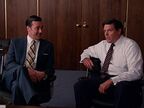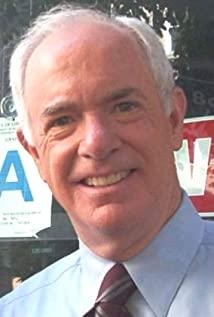Don went to his hippie girlfriend once and there was a man at the door. Later, he called Don: the ad man. Donald Draper, the Madison Street ruthless character is just a symbol outside the advertising world - just like the black silhouette in the title, faceless, holding a briefcase, passing a woman's legs, falling, falling, alone, smoking - adman , he and "them" are group portraits of American 1960s Manhattan advertising people, no different, in hippie words, they "look square" "create lies" "are just boring middle class people". In the end, the hippie girlfriend ran away with the hippie boyfriend. Don left her a check and said to her, "get yourself a car", which is exactly the same as giving his brother adam whitman $50,000 to let him stop disturbing his life. The first season is full of such conflicts: family vs career (for example, Don uses his career to rebuild his identity and chooses to use money to drive away his younger brother adam, who symbolizes his poor childhood), career vs love (for example, Don and Mengen are business partners but can't control their entanglement in love. Desire), love vs native family (for example, the emotional game between campell and trudy usually uses their superior family background as a weight). Satisfying the selfish desires of prying eyes, or as a mirror of real life, Madman is an excellent drama that has both profound issues and formal aesthetics.
ambition
Peggy said to the man in an unhappy blind date: "Those people, in Manhattan? They are better than us. Cuz they want things they haven/t seen." Her understanding of Manhattan girls is not limited to what the man said act like a Manhattan, but a state of mind to have. The Manhattan of the 60s was the golden city for advertising people, and the male gaze that followed one after another for women with careers. Faced with the wonderful "boxes of kisses" (belle jollie lipstick advertisement) that Peggy came up with, the men's reaction was "like watching monkeys play the piano", followed by a burst of laughter, which shows the survival atmosphere of 60s women in the workplace. . Peggy seemed ready. From typists, to active conversations in brainstorming, to demanding words, to asking for a raise, and finally to copywriting, and that's just the beginning. The boss Don's evaluation of Peggy is "eyes serious enough to burn people". Compared with Joan, another female character in Sterling Cooper, Peggy's style of doing things seems to be more neutral, and does not rely on female characteristics such as body and motherhood to achieve goals. . She presents the case like a man, and like a man asks the voice actor to "imagine yourself as a happily married woman", her restraint and rationality in her work are almost cruel. In this sense, Peggy is a lot like Don. On the night of the Kennedy-Nixon election, the office held a party all night long. The next day Peggy filed a police report because her colleague was having fun and lost the contents of her locker, causing her colleagues to crowd out. She walked into Don's office and wept secretly, just the day Don was threatened by Pete and revealed that Don was not Donald Draper at all, but the deserter Dick Whitman. Peggy cried and asked Don: I don't understand. I'm trying to do my job, I follow the rules. And people hate me. Innocent people get hurt and other people, people who are not good get to walk around and do whatever they want. After that, Don let her take a sip of wine and he took a sip too. At that time, Don was once again lost like a child because of his humble background. Not only in the first season, but until the seventh season, he has always been in the pain of losing his identity. After being threatened by Pete, Don went to Miss Mengen and told Mengen his deepest secret, his life experience. But he did not let go, and childhood memories flashed back in every solitude and late night. Don developed the idea of "leaving home" and "adrift" at a very young age. His mother was a prostitute and died in childbirth, so he was forced to live on a closed, remote farm with his grumpy father and stepmother. One day, a cosmopolitan tourist came to the farm. He said that he would leave a mark every time he went, one of which was an axe, indicating that there were wicked people here. After he left, Don found the axe mark on a tree outside the farm. Tourists tell him late at night how his old life was "full of death", and one day he decided to throw everything away and start a new and completely different life - maybe since then, Don has become a homeless, he does not really s home. After finishing speaking, Don let her take a sip of wine and drank it himself. At that time, Don was once again lost like a child because of his humble background. Not only in the first season, but until the seventh season, he has always been in the pain of losing his identity. After being threatened by Pete, Don went to Miss Mengen and told Mengen his deepest secret, his life experience. But he did not let go, and childhood memories flashed back in every solitude and late night. Don developed the idea of "leaving home" and "adrift" at a very young age. His mother was a prostitute and died in childbirth, so he was forced to live on a closed, remote farm with his grumpy father and stepmother. One day, a cosmopolitan tourist came to the farm. He said that he would leave a mark every time he went, one of which was an axe, indicating that there were wicked people here. After he left, Don found the axe mark on a tree outside the farm. Tourists tell him late at night how his old life was "full of death", and one day he decided to throw everything away and start a new and completely different life - maybe since then, Don has become a homeless, he does not really s home. After finishing speaking, Don let her take a sip of wine and drank it himself. At that time, Don was once again lost like a child because of his humble background. Not only in the first season, but until the seventh season, he has always been in the pain of losing his identity. After being threatened by Pete, Don went to Miss Mengen and told Mengen his deepest secret, his life experience. But he did not let go, and childhood memories flashed back in every solitude and late night. Don developed the idea of "leaving home" and "adrift" at a very young age. His mother was a prostitute and died in childbirth, so he was forced to live on a closed, remote farm with his grumpy father and stepmother. One day, a cosmopolitan tourist came to the farm. He said that he would leave a mark every time he went, one of which was an axe, indicating that there were wicked people here. After he left, Don found the axe mark on a tree outside the farm. Tourists tell him late at night how his old life was "full of death", and one day he decided to throw everything away and start a new and completely different life - maybe since then, Don has become a homeless, he does not really s home.
Where is home is an important topic in postcolonialism. In mad man, Don's exploration and reconstruction of identity is also a process of finding "home". For him, the farm as a child was not home, and he lost his real and only family very early on - his mother. He betrayed his younger brother, left home to join the army, mistakenly detonated a landmine that killed Lieutenant Colonel Donald Draper, stole the identity of the deceased, and finally established a "new home" in Manhattan. However, the defects of the original family subtly affected his life with his wife Betty. He could not understand and imagine Betty's feelings for his mother. He even concealed the troubles of his work and the secret of his origin from Betty - he could not carry out the real relationship in the intimate relationship. communication. In episode 12, Don became a partner of the company. Pete threatens Don to sue Bert without promoting him. Bert gave an unexpected answer. The definition of this home reflects the values in the hearts of advertisers, and finally, influences decision-making and controls the operation of the capital market. In a way, Bert's words reveal the ambition of the entire advertising industry - he doesn't care if a person's words are true or not, and he doesn't care if his life is a lie. He said: Who cares? This country was built and run by men with worse stories than whatever you've imagined here. The japanese has a saying, a man is whatever room he is in and right now, Donald Draper is in this room. TO BE CONTINUED CHAPTER 2 Loyalty CHAPTER 3 Eros CHAPTER 4
View more about Mad Men reviews











